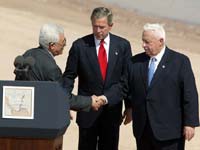
When battles are waged over values and ideologies, you can't bribe or reason your way to peace. That's the stark message from a new psychological study of people in the heart of the Israeli-Palestinian conflict.
 The fight over the land of Israel/Palestine has raged for over a century and the peace process has been difficult, lengthy and often stagnant. All the while, lives continue to be lost in skirmishes and suicide attacks, as the past weeks have painfully demonstrated. Perhaps it's time to put the situation under some scientific scrutiny.
The fight over the land of Israel/Palestine has raged for over a century and the peace process has been difficult, lengthy and often stagnant. All the while, lives continue to be lost in skirmishes and suicide attacks, as the past weeks have painfully demonstrated. Perhaps it's time to put the situation under some scientific scrutiny.
A huge number of modern conflicts are fuelled by differences in opinions and beliefs, rather than grabs for power or land (at least on the ground level). Even if the foundation of a dispute is not initially a moral issue, it can quickly become one. Land, for example, is a solid resource that can be completely transformed into something much more by adding the word 'holy' in front of it.
In these situations, people tend to forgo a rational weighing up of pros and cons in favour or making decisions with an intuitive moral compass. Jeremy Ginges and colleagues from the New School for Social Research studied the effects of this switch against the backdrop of the Israeli-Palestinian conflict. Through a series of psychological experiments, they worked out that in these circumstances, the power of symbols is far greater than that of currency or logic.
They surveyed over 1,800 from three different groups: Jewish Israeli settlers, Palestinian refugees, and Palestinian students (half of whom were members of Hamas or related organisations). Ginges asked the participants to consider hypothetical scenarios where they would have to compromise over issues that were particularly relevant to them. The Israeli settlers were asked about their willingness to exchange their land for peace, which would involved them having to relocate. The Palestinian refugees had to consider giving up their right to return to their former homelands. And the Palestinian students were asked to consider Palestine relinquishing sovereignty over Jerusalem.
Unsurprisingly, all the participants were reluctant to compromise. But Ginges found that they fell into two camps based on the strength of their convictions. The first, who he termed the 'non-absolutists' expressed no more than a strong preference against any compromises. The second group, the 'moral-absolutists', had elevated the respective issues to the status of sacred values and were more fervently against losing any ideological ground.
 For example, about half of the Israeli settlers felt that the Jewish people should never cede part of the 'Land of Israel' not matter the cost or benefit. The other half opposed the loss of land but did not rule it out under extreme circumstances.
For example, about half of the Israeli settlers felt that the Jewish people should never cede part of the 'Land of Israel' not matter the cost or benefit. The other half opposed the loss of land but did not rule it out under extreme circumstances.
So far, so predictable. But the real surprise came when Ginges offered the participants the same compromise but with a rational incentive to sweeten the deal. The incentives included peace, resulting from the end of all hostilities, or money, in the form of substantial donations from the US or the European Union.
Faced with these added carrots, the two camps behaved very differently. The non-absolutists tended to take a pragmatic stance and softened their responses. After all, in rational terms, the extra benefits are better than nothing. But the moral-absolutists from both the Israeli and Palestinian sides showed even more outrage than before and an even greater number supported a violent response. For these people, bribes or appeals to reasons were just making things worse.
Symbolic incentives had the opposite effect. Moral-absolutists were more willing to compromise over their own sacred values if they saw that the other side was prepared to do the same. For example, the Palestinian refugees were more prepared to recognise Israel's right to exist if Israel would in return recognise the historic legitimacy of the refugees' right to return. They were less angry about the thought of compromise and less supportive of violent responses or suicide attacks.
The swings in opinion were small but significant - elections in the Middle East have been settled by much smaller majorities. It did not matter if these symbolic gestures altered the costs or benefits of the compromise, and indeed, in most cases they did not. It didn't even seem to matter if the deals would be successfully carried out, and those surveyed were not confident that they would be.
 Amazingly, when you consider that this conflict regularly takes the lives of hundreds of people, it was the gesture that counted. It was the fact that one side showed willingness to even budge on matters of principle that prompted the other to do the same. It just goes to show that when people promote their ideas to the rank of beliefs, they risk losing the ability to view those issues rationally.
Amazingly, when you consider that this conflict regularly takes the lives of hundreds of people, it was the gesture that counted. It was the fact that one side showed willingness to even budge on matters of principle that prompted the other to do the same. It just goes to show that when people promote their ideas to the rank of beliefs, they risk losing the ability to view those issues rationally.
Ginges has an explanation for this. He believes we are almost programmed to avoid weighing things up in terms of costs and benefits when they concern our values or beliefs, preferring instead to rely on a moral compass. Indeed, we have such an inherent distaste for attempts to measure moral commitments in such a calculating way that such attempts are likely to be met by outrage and anger. So it was with the Israelis and Palestinians surveyed in this study.
In these situations, attempting to resolve the situations through logical arguments or financial bargaining can seriously backfire. Symbolic trade-offs hold much greater power in ensuring that peace can be achieved.
Reference: Ginges, Atran, Medin & Shikaki. 2007. Sacred bounds on rational resolution of violent political conflict. PNAS 104: 7357-7360.
Images: Photo of Palestinian woman and Israeli soldier by Justin McIntosh.


Fascinating and timely. I am seeing this same sort of division played out right now in various discussion formats online, blogs and list-serves, both political and ostensibly non-political, in which the mid-East situation is being vehemently discussed. Often conflicts are talked about in terms of pragmatics and the underlying beliefs about self & other are never exposed and examined. In a much less violent context, for example: lawns. Beliefs about what it says about yourself and your community underpin environmental conflicts but the discourse often hides those underneath the issues of jobs, crime, vermin, health--whether those are factual or not. If only we could understand each other's beliefs, sympathetic gestures might eventually lead to the possibility of pragmatic solutions.
This post hits rather close to home. I live in a part of Israel that may would call the 'occupied territories'. I moved here two years ago after having lived 16 years in northern Israel. We left there in the course of (but not as a result of) the Second Lebanon War. Katyusha rockets fell in the dozens on my home town for the duration of the war. Much as been happening to towns within internationally recognized Israeli boarders near Gaza.
I actually consider myself somewhat moderate over here. It still seems to me that Israel has made an endless career of symbolic and real tangible gestures to a people that just continuously throw it back in our faces. Over 3000 missiles and rockets have been fired into Israel from Gaza over the last two years since our departure from there. After all of our gestures the Palestinians (not even the moderate ones) have taken the trouble to:
1. Remove from their government charter the imperative to destroy the 'Zionist Entity'.
2. desist from educating their children towards hatred of Jews (see their educational textbooks)
3. Include Israeli boarders on any map in textbooks or news agencies.
The list goes on. The point is, there has been no real bidirectional peace process over here, just the Israelis giving for nothing in return.
I feel that the paper you summarized is yet another oversimplification of an extremely complicated situation that just glazes over too much history to be taken seriously.
Yismith - I value your firsthand experience but I think you're reading the paper unfairly.
The goal of the researchers was to understand an aspect of human psychology. The Israeli-Palestine conflict provided a relevant backdrop that allowed them to do so. But it was just that - a backdrop. They did not set out to explain the current conflict. If they had, I would agree with you that it would be a very oversimplified take.
The Israeli-Palestinian conflict is very much (though not entirely) about solid physical land: just take a look at these maps (as compared to the standard western-media version at the top of this post).
"Never let your sense of morals prevent you from doing the right thing."
--Issac Asimov
What's so surprising about it? For those whom participation in a conflict is a moral duty, the whole basis of their dedication is the belief that the enemy consists of utterly despicable villains. Such gestures shake the very foundation of that belief. It entirely fits common sense and everyday experience.
I think there are two kinds of social sciences: one that's utter nonsense and one that just reaffirms we've always known from common sense and experience. The later is the better one, this is why I like this blog. You are just reinventing common sense - but even that's much better than others who try to challenge common sense.
I wonder how someone who would be outraged at a "bribe" might respond to policies that reward "the enemy" when they themselves misbehave. If every Israeli killed by Palestinians meant a million dollar increase in US aid to Israel, would that deter attacks? What if every Palestinian civilian killed by Israeli military action meant a similar decrease in aid to Israel? (In both cases, we'd need to be sure the aid wasn't spent on weapons.) Imagine extremists on both sides thinking "they deserve to die, but killing them actually makes their side stronger." Seems like this might calm things down, even though it's obviously not a complete solution.